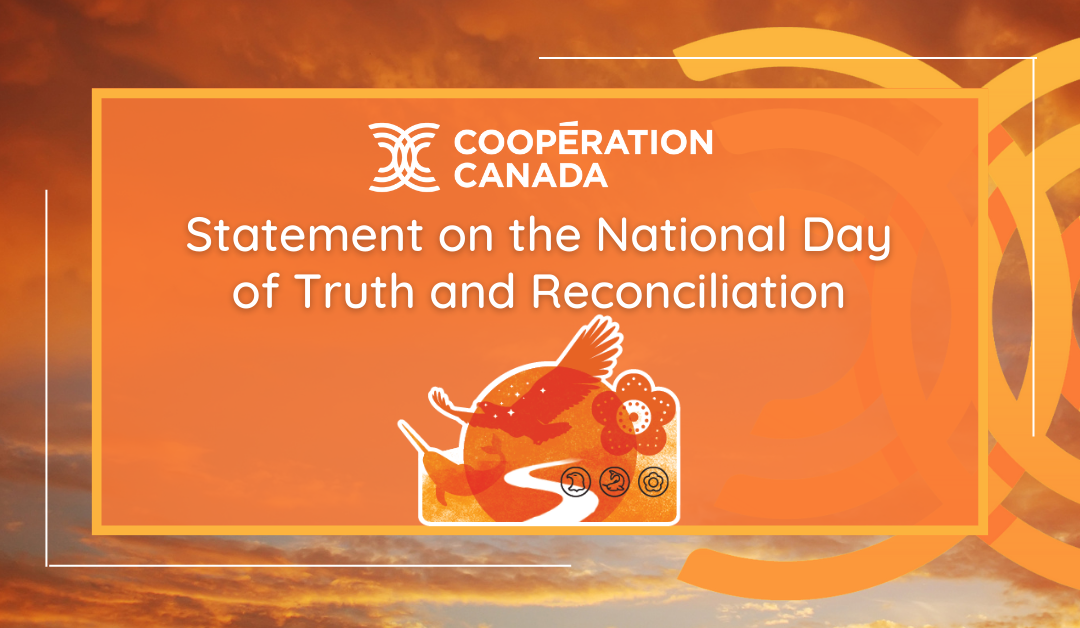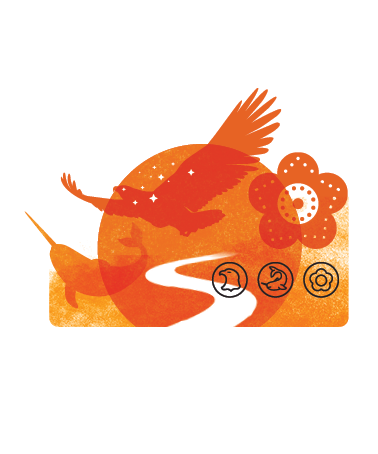On September 30, 2023, Cooperation Canada will mark the third National Day for Truth and Reconciliation. Our offices will be closed on October 2, 2023. We are encouraging our team, members and partners to reflect on the historic and ongoing violence committed against Indigenous Peoples on Turtle Island, take steps to advance the Calls to Action and Calls to Justice to realize the rights of Indigenous Peoples, connect with and celebrate diverse Indigenous cultures and wisdom, and honour the land and its ancestral keepers.
Over the past year, unprecedented forest fires impacted Indigenous and non-Indigenous communities across Turtle Island. Political leaders were urged to search the Prairie Green landfill for the remains of Morgan Harris and Marcedes Myra. The trauma and lasting impacts of Canada’s residential school system remain, as the search for unmarked grave sites continues across Turtle Island for many Indigenous communities. The impacts of colonization are a call to action for decolonization, reconciliation and concrete steps to advance the rights of Indigenous Peoples.
As early and recent settlers and visitors on this land, the Cooperation Canada team recognizes the historic and ongoing abuse and trauma inflicted by colonization on Indigenous Peoples. The team has been encouraged to join cultural events, learning circles, take action and hear from storytellers to support advancement on their individual responsibilities to reconciliation.
In the coming months, Cooperation Canada will release its Anti-Racism, Equity, Diversity, Inclusion and Justice Strategy and Action Plan (2023-2026). Following over a year of board and team engagement and support from experts at SLD Consulting and Quakelab, the coming strategy includes a commitment to strengthening relationships with Indigenous communities, culminating in a roadmap to support Cooperation Canada’s commitment to reconciliation and Indigenous rights.
Cooperation Canada also continues to advance our collective duty towards reconciliation. Working with Oxfam Canada, we supported the creation of an informal network for Reconciliation and Indigenous Rights. Through this network, organizations working in international cooperation have shared how they are advancing reconciliation within their organization and in partnership with Indigenous Peoples in Canada and beyond. The network serves as a space for candid and humble discussions, sharing and learning.
Reflection is an important part of marking national days of recognition and often a starting point for engagement and action. A key part to meaningful and impactful decolonization and reconciliation work is being intentional and honest. This year, the Anti-Racist Cooperation (ARC) Hub has prepared a set of questions to help guide these reflections in the spirit of building connections and relationships.
For organizational, collective reflections:
- How are we building/creating spaces for Indigenous People, as partners or staff, to thrive in our organizations?
- How do we value Indigenous knowledge and wisdom in our organization?
- What barriers exist within our organization for Indigenous participation and ways of working? How can we reduce or get rid of these barriers?
For personal reflections:
- How does reconciliation inform and impact my own work here and in other communities?
- Why is it important for me to support Indigenous People and their efforts towards decolonization on Turtle Island?
- Other than the land honouring and recognitions we do at our gatherings, what do I know about the Indigenous communities around me?
Cooperation Canada acknowledges the international cooperation sector has much work to do to confront colonial legacies both in terms of how organizations operate on Turtle Island and in global collaboration. In the coming year, Cooperation Canada will begin discussions with its members to review of its Code of Ethics. These efforts will include discussions with members on integrating Indigenous ethics and our shared commitment to reconciliation into the renewed Code of Ethics. Decolonization is a practice and one that requires personal and organizational commitment and effort. We look forward to working with our membership, Indigenous Peoples and partners to advance reconciliation and decolonization in the coming year.


